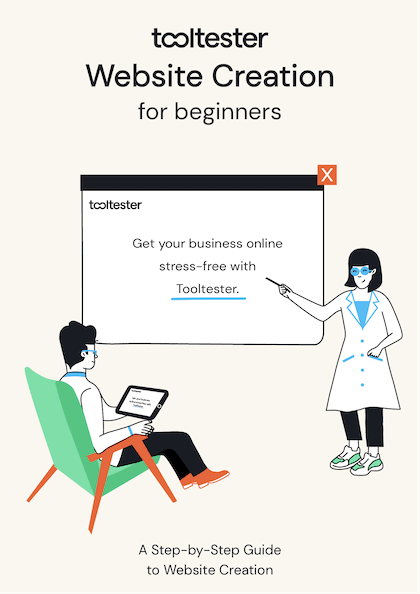Tooltester is supported by readers like yourself. We may earn an affiliate commission when you purchase through our links, which enables us to offer our research for free.
Gone were the days when review sites, like Yelp, were the only places to check out restaurant menus, quality of food, and service.
Restaurant owners have decided to take control of the narrative by launching informational websites that allow them to tell their stories and provide more accurate information to their customers.
Perhaps this is why you’re looking into creating a website for your business. Or maybe you’re interested in expanding your website’s functionality to include online reservations and online ordering. After all, the global pandemic only boosted the popularity of these types of restaurant websites.
Choosing the best restaurant website builder for your business depends on what you want your website to accomplish. However, we recommend that you don’t skip over some industry-specific features, such as templates and third-party restaurant marketing and management integrations.
With these in mind, we’ve checked some of the best restaurant website builders out there to help you narrow down your options. Read on to discover 9 platforms we’ve tested and have proven to be the best.
Best Restaurant Website Builder: Our Top Picks
If you’re short on time and can’t explore all the website builders on our list, here are some quick snippets of what we recommend for different types of restaurant websites.
Best Restaurant Website Builder for Informational Content
Squarespace excels at building informational restaurant websites that offer branded resources to active and potential guests. The variety of restaurant-specific templates and menu layouts make the website building process more straightforward than other website builders’; all you have to do is fill in your information and upload your photos.
With this website builder, your visitors can view menus without downloading PDF files. As a result, they’re likely to stay on your page longer and discover more about what you offer. Also, we tested its blogging features and found them to be extremely user-friendly and versatile.
Best Restaurant Website Builder for Online Table Bookings
Based on our experience, there are two best restaurant website builders for the job: Hostinger Website Builder (formerly known as Zyro) and Wix. Hostinger’s restaurant-ready templates have built-in booking pages. No third-party app needed. You simply need to tweak the page to match your brand, which only takes a few minutes.
On the other hand, Wix has a proprietary app for accepting and managing online bookings, Wix Reservations. You can also send email notifications and text messages to discourage no-shows.
> Try Hostinger Website Builder today
Best Restaurant Website Builder for Online Ordering
Wix has a free native app called Wix Restaurant Orders, allowing customers to order directly from your website, select home delivery or pick-up, and pay online or in person (provided your Wix site is on a paid Business plan). For other builders, third-party apps (which are often paid apps) are needed.
To top it all off, you can use Wix’s ordering system to manage and track phone orders, giving you a complete view of the total volume of orders.
Best Free Website Builder For Restaurants
Weebly has a free plan, which is generous feature-wise. Other website builders will only allow you to create basic websites with their free version. With Weebly’s, however, restaurant owners have access to Square’s e-commerce capabilities. Restaurant websites can take advantage of gift cards, in-store pick-up, and restaurant-friendly templates for no cost. The only issue is that you won’t have a custom domain.
Using a General Website Builder vs a Specialized Restaurant Website Builder
General-purpose site builders can be used to create almost any type of website, while specialized website builders are designed for specific markets (in this case, restaurants). Being aware of this is essential as it determines what tools you’ll have at your disposal.
General website builders, such as Wix, Squarespace, GoDaddy, Weebly, and Hostinger come with built-in tools like blogs and ecommerce. They offer a greater range of features and integrations to cater to any field, including the hospitality industry. But you’ll often have to search for and enable restaurant-specific features such as menus, online ordering, and bookings (which are usually only available via apps).
On the other hand, restaurant website builders, such as BentoBox, Flavor Plate, and UpMenu, have built-in menu and ordering features, and more suitable restaurant templates. In addition, you can rely on a team of support staff with extensive experience in creating and managing restaurants online.
There are also restaurant management software tools, such as GloriaFood, which support website creation. Their features resemble those offered by restaurant website builders.
The 9 Best Website Builders for Restaurants
On this list, we’ll talk about six general site builders with excellent restaurant-friendly features (See #1 to #5) followed by 4 restaurant website builders (#6 to #9) making waves in the hospitality industry. Read our in-depth observations to find out which is the best website builder for restaurants based on your establishment’s needs.
1. Wix
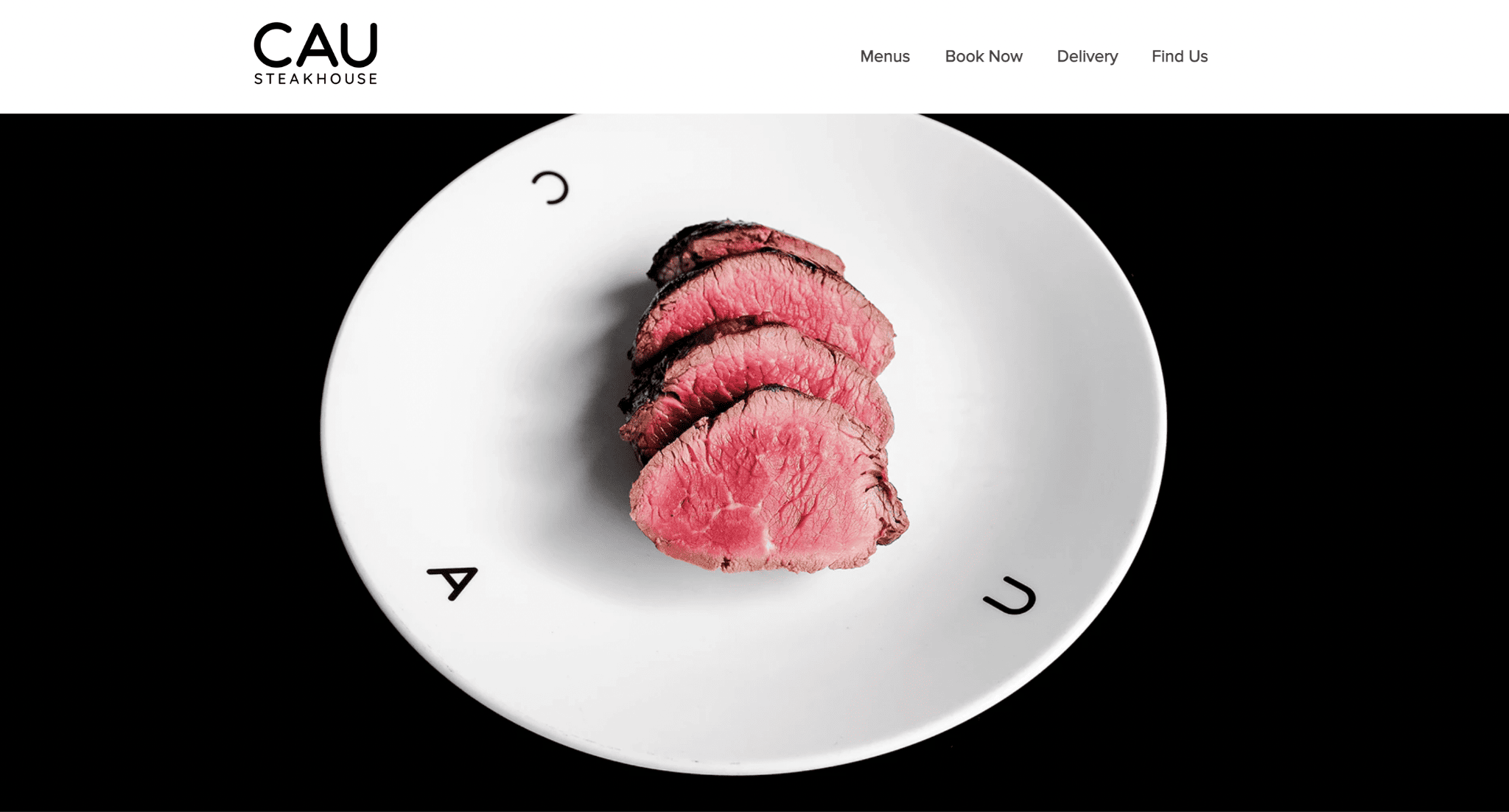
An example of Wix restaurant website: Cau Restaurants. See more Wix restaurant live examples here.
Wix is one of the best website builders on the market, and it’s been used to create a diverse range of restaurant websites. It features 60+ stunning restaurant templates and about 700 more non-restaurant templates that you can modify to fit your establishment. Type “Restaurants” in the search box to see some of their most suitable layouts for you:

Wix has the most abundant selection of restaurant templates.
Customization is easy with the powerful drag-and-drop editor. As you can see in our Wix tutorial, there’s little complexity and few constraints in moving and changing the design elements, allowing you to get as close to your dream website as possible. We consider it the most flexible website builder.
Another possibility is to leave it up to Wix’s AI builder (ADI) to find the best template for your business. But if you want full control, you can ditch the templates and start from scratch. Check out our guide on how to build a restaurant website with Wix.
Important Features for Restaurants
Wix boasts several features that restaurateurs will appreciate. Many of Wix’s restaurant templates come with the Wix Restaurant Menus app. The app makes it effortless to add your dishes to your website. All you need to do is create a menu and add sections to highlight your food items.

Labels, such as ‘spicy’ and ‘gluten-free’ are also available to simplify product descriptions for your restaurant website.
It also offers multiple menus and allows you to customize each dish. Despite its design flexibility, however, the app has navigational issues and multilingual function limitations. Many users have complained about the difficulty of creating different menus based on language and the location on a webpage.
With a Business Plan, you have access to Wix Restaurants Orders. This app allows customers to order directly from your website. Customers can pick up their order or have it delivered, as well as pay online or offline. The app also allows users to add phone orders to its system.
The Wix Reservations App enables you to accept bookings online day in, day out. The app also lets you add information, such as the number of guests and the duration of the table reservation. Additionally, you can receive notifications about online reservations, and send out notifications and confirmations to customers to prevent cancellations.
These three Wix apps can be downloaded for free and even come included in some templates. Wix Owner App gives you the freedom to tweak and manage these apps in one place, but with limited control over all the features available. For instance, you can update the menu stock and visibility using Wix Owner, but you’ll still need the Wix Restaurant Menu app to edit and add menus.
Wix also has Dine by Wix, an ordering app where you can list your business to gain more exposure.
Aside from these proprietary apps, Wix’s App Market offers more advanced apps that can extend your restaurant website’s functionality. Among them are Eat App for reservations and DoorDash Drive for deliveries, which have more of an established reputation than Wix’s proprietary apps.

Integrations are also available for promoting your website, ranging from social media marketing to email marketing, and help create anything from popups to discount coupons.
Last but not least is Wix Search Engine Optimization (SEO), which has leveled up over the years. Wix’s SEO Wiz will provide tips to help you improve your online presence. And since local SEO is key for restaurants, Wix lets you include your location in the title tag and get on Google Business.
Pros
- Beautiful restaurant website templates
- Marketing and management apps available in the marketplace
- Two apps: one for you, one for your customers
- One-stop system for managing phone and online orders
- Numerous third-party app integrations are available
Cons
- The more affordable plans come with minimal storage and bandwidth
- Some proprietary apps lack sophisticated features and receive poor user ratings
Pricing: Wix has a free version, which carries Wix branding. The Light Plan ($17/month billed annually) is the first ad-free plan. However, to take advantage of the Wix Restaurant app’s advanced features (e.g. online orders and reservations), you’ll need at least the Core plan, which starts at $29/month. Learn more here.
Read our Wix Review here.
2. Squarespace

An example of a Squarespace restaurant website: Blue Dog NYC
Squarespace is a designer’s paradise. Its class-leading templates are hard to replicate. You can choose from any of them or go with one of the 16 timeless restaurant templates. You’re sure to find an aesthetic that fits your type of cuisine offerings, as these popular restaurants have done with their Squarespace site.
Squarespace’s themes are often visual-driven, giving you plenty of opportunity to display your restaurant’s menu items and dining areas creatively.

Squarespace features clean and crisp restaurant templates.
Once you’ve selected one from the many stunning templates (no easy task, we know), Squarespace’s minimalist editor is at your disposal. When you make changes to your prebuilt sections, you can immediately see how your page will look. But this also means the design elements are restricted to these blocks (unlike with Wix, where you have complete freedom to make changes anywhere you like). In addition, we find its simplicity hinders its usability.
Despite all these shortcomings, the Squarespace editor has several advantages over its competitors: changing templates doesn’t require starting over, and it has a design panel that controls the entire website’s appearance. These don’t hold true for more intuitive website editors, such as Wix.
Important Features for Restaurants
Although they offer the relevant features, Squarespace isn’t well-known as a restaurant website builder. From a design standpoint, it’s a winner. But the extra features they have for managing your restaurant come as a hefty add-on.
For instance, their own restaurant management system, Tock, starts at $199/month and charges 2% for prepaid reservations.
Thankfully, their ecommerce solution is much more accessible. In terms of online ordering, Squarespace integrates a storefront into your restaurant website, so you can sell gift cards and food items directly from it.
However, we believe that Squarespace’s greatest strength lies in its ability to create excellent informational restaurant websites. Starting with the Business plan, you can add categories to your website and display selections on a single page or create multiple pages. It’s much better than asking your potential customers to download a PDF, especially if they’re viewing your site on a mobile device.
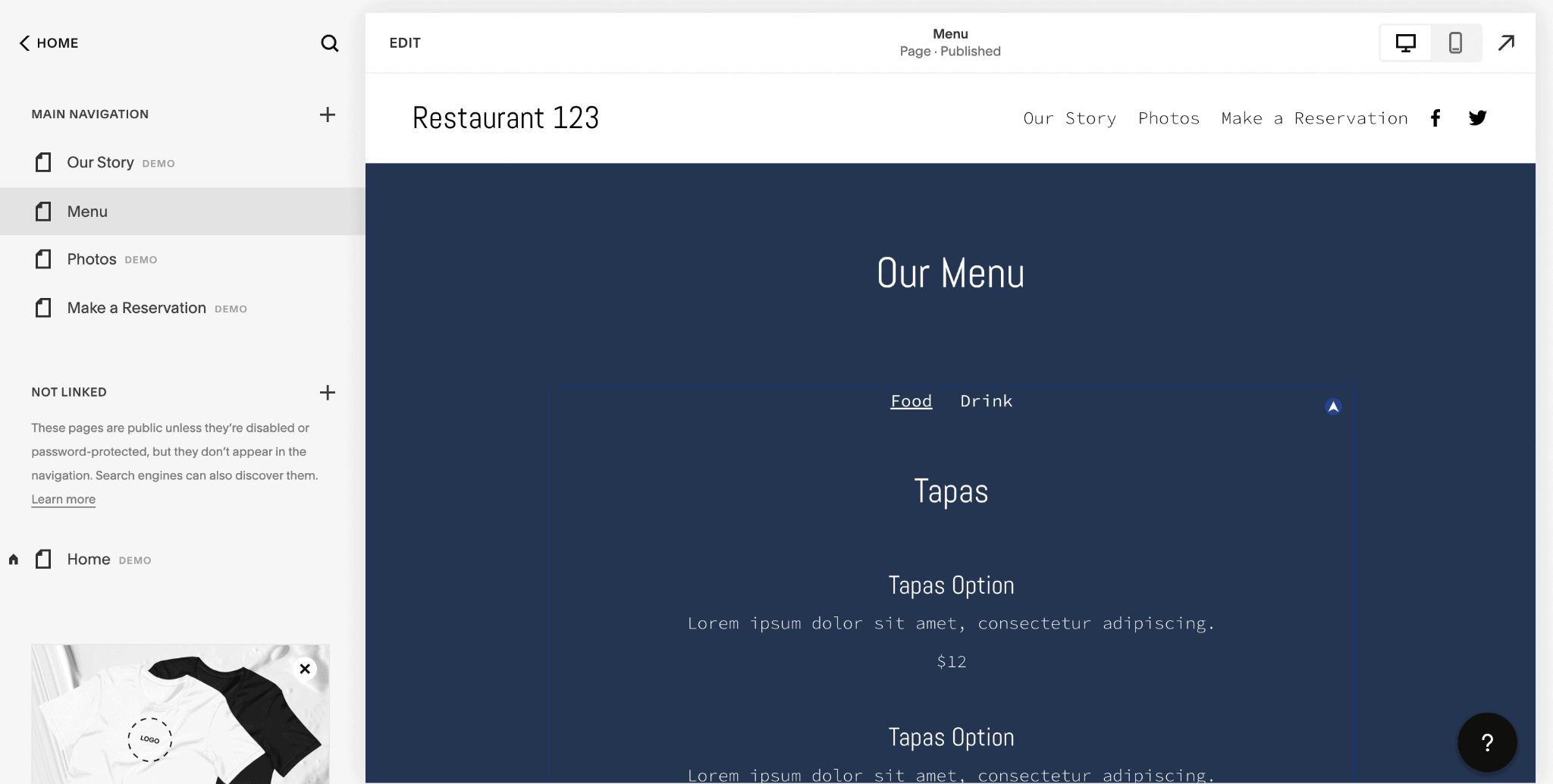
Create multi-page menus with Squarespace.
Integrations lend Squarespace more restaurant-specific functionality. For instance, OpenTable lets you accept online reservations, while ChowNow lets you accept online orders. These services provide a good alternative to Squarespace’s Tock as they tend to be more affordable.
Squarespace SEO is also set up well, covering meta tags, clean URLs, and mobile compatibility. If you want to localize your website, you can include a Google Map on any page.

Add a map to your Squarespace website in just a few clicks
The platform also has a decent amount of extensions to help you market your online website. While most of them are suitable for product-based ecommerce businesses, generic marketing tools will work well for your restaurant marketing initiatives. A good example is Outfy, which helps you create and schedule posts for your social media pages.
Pros
- Squarespace has the best restaurant templates out there
- Abundant SEO and marketing tools
- Design beautiful menu layouts
- Change themes without starting over
Cons
- No free version
- Tock is costly, so it may make more sense to opt for third-party extensions (which usually aren’t free)
- While the editor is fairly easy to navigate, it’s not as intuitive as true drag-and-drop editors
Pricing: Business plans start at $23/month if you opt to pay annually. To remove transaction fees, opt for a Commerce plan - Basic Commerce costs $28/month, and Advanced Commerce, $52/month. Learn more here.
Read our Squarespace review here.
> Get started with Squarespace today
3. Weebly
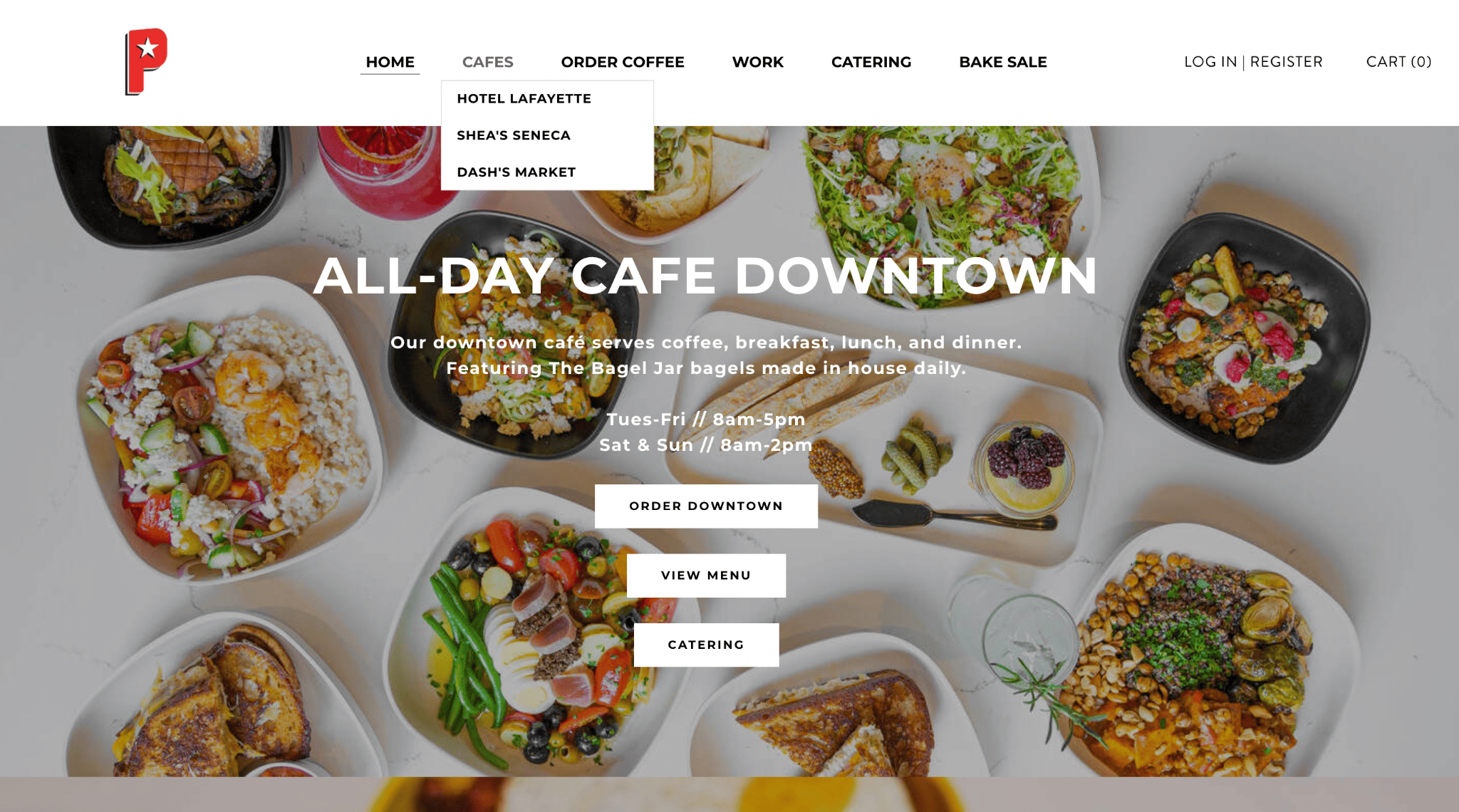
Source: Public Espresso
Weebly is a budget-friendly platform suitable for dipping your toes into restaurant website building. Weebly’s selection of restaurant-themed templates is fairly limited, but each looks professionally designed for easy customization and is mobile-friendly:
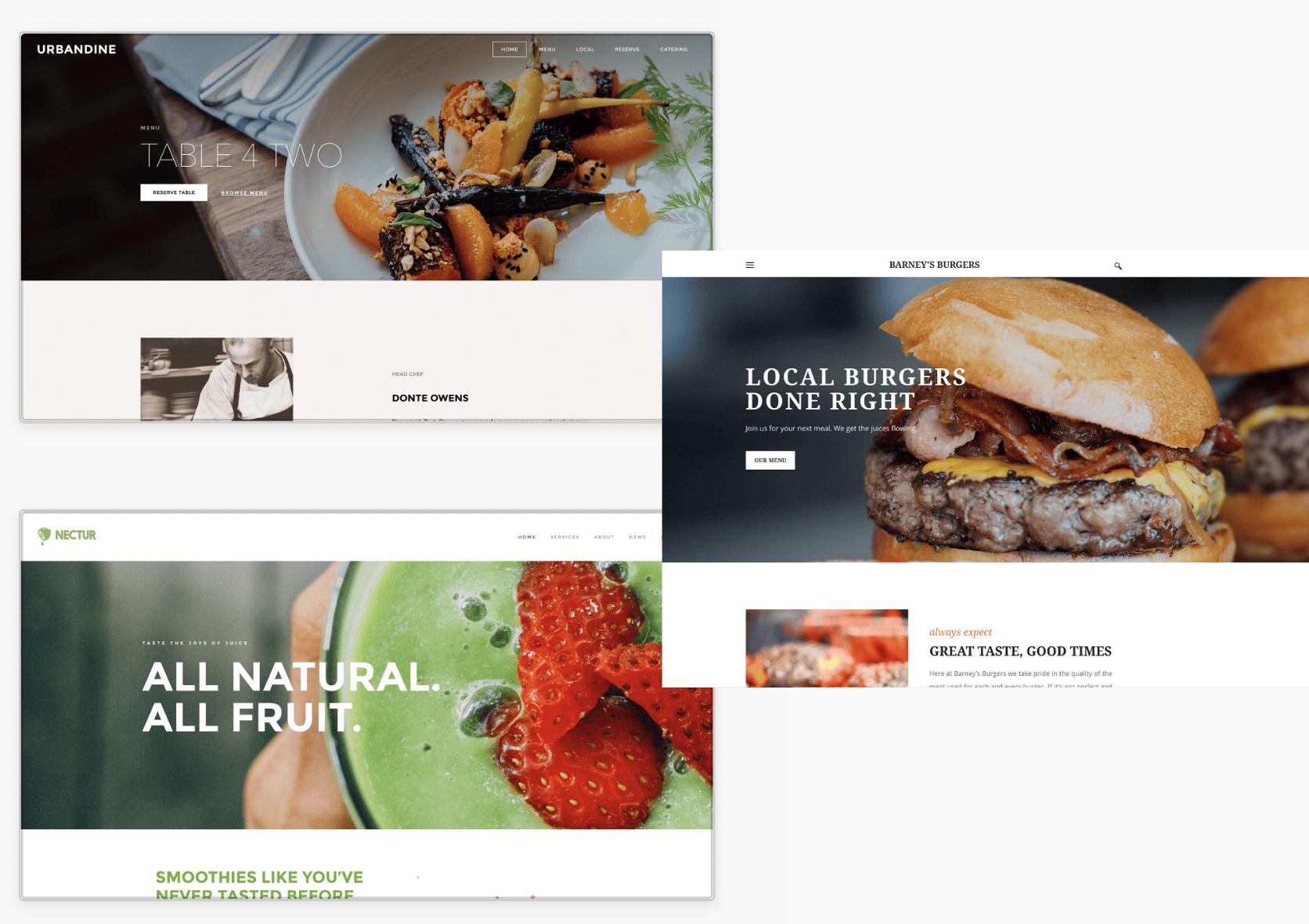
Weebly has a good but limited selection of restaurant templates.
If nothing suits your fancy, use the drag-and-drop editor to modify a non-restaurant theme to make it more fitting for the hospitality industry.
While the editor isn’t as flexible as Wix’s, the section-based feature makes it more beginner-friendly. However, the content blocks are fixed in design, preventing you from fully customizing your site. You can work around this by adding more elements to your website.
Important Features for Restaurants
If you only need a low-maintenance website for your customers to stay informed about your business or see your menu, Weebly’s good to go. It allows you to create easily navigable drop-down menus for food and drinks.
Square powers the platform, lending ecommerce functionality to your website. Features, such as gift cards and coupons, are available starting with the free plan.
All paid plans come with SEO tools, pop-up notifications, Instagram integration, and customizable forms. So for as low as $6, it’s worth it. Using Weebly will also give you access to a variety of Square apps. Square for Restaurants’ POS has a free plan that allows restaurant owners to accept online orders and payments. However, any online payment incurs 2.9% + $0.30 regardless of the plan.
A quick search on Weebly’s App Center will show you restaurant-specific apps, such as Open Menu for creating menus and GloriaFood’s Restaurant System for food ordering and reservations:

But for marketing tools, you can use any tool that works for websites in general. Choose from categories: Boost Traffic, Spike Sales, and Get Social.
Weebly’s SEO also covers the basics, such as page titles and meta descriptions. Google Search Console and Google Analytics are available to give valuable insights into how your website is performing. Furthermore, if you speak SEO, you can use the platform’s advanced SEO tags to optimize your site.
Pros
- Forever free plan comes with really useful ecommerce features
- Multi-level navigation menus
- Square integrations, such as POS
- Decent selection of marketing apps
Cons
- Limited restaurant-specific templates
- Weebly’s lack of development means new features are hard to come by
- The basic plan, which costs $6, is still branded
Pricing: Weebly offers free basic use, but you can connect your site to your custom domain for $10/month billed annually. If you want more features for your restaurant, opt for Professional ($12/month) and Performance ($26/month). The Professional plan offers better customization and management features than the Personal Plan, whereas the Performance Plan provides similar capabilities, but tops it off with more growth and operations tools.
Read our Weebly Review here.
> Get started with Weebly today
4. GoDaddy

An example of a GoDaddy Restaurant Website: Gogi Korean Restaurant
GoDaddy delivers high-quality small business restaurant websites. The platform offers 26 restaurant-specific templates, all of which they’ve dubbed “foodie-approved”.
Some of these templates are content-focused, while others center around images. Your choice will depend on your brand positioning.

Source: GoDaddy
GoDaddy’s editor shares the same strengths as Squarespace’s. They’re both visual editors, so you can monitor the changes as you go. You can also change themes with ease without having to start from scratch. (Read more about this in our GoDaddy vs Squarespace comparison.)
However, this level of convenience comes at the expense of customizability - you don’t have as much control over design and layout as you do with editors like Wix.
Important Features for Restaurants
GoDaddy creates basic restaurant websites, but it has a strong toolkit for building an online presence. From a single dashboard, you can access and control the following aspects of your restaurant marketing initiatives:
- Developing a marketing calendar
- Blogging
- Social media content creation and management (thanks to the Canva-like GoDaddy Studio and Content creator)
- Setting up and monitoring ads
- Boosting SEO (GoDaddy’s SEO Wizard)
- Email marketing
While some of these features, such as blogging, aren’t fully fleshed out, having everything in one place is a big plus. The SEO Wizard and Studio and Content Creator offer value to restaurant owners, regardless of their skill level.

GoDaddy’s Studio and Content Creator works very much like Canva
In terms of more restaurant-specific features, GoDaddy’s OpenTable integration makes it possible to book a reservation straight from your website. Ordering systems, such as ChowNow, Toast, and MENUDRIVE, enable the online ordering feature for your website if you don’t want to use GrubHub or DoorDash.
Pros
- A good selection of restaurant templates
- Excellent selection of built-in branding and marketing tools
- Affordable fees
- Restaurant-specific integrations
Cons
- Fees increase after the first year
- It only creates restaurant websites with basic menu layouts
Pricing: GoDaddy gives new users a 1-month free trial. After that, you can choose to stay on the limited free plan, or one of the paid options: Basic ($11.99/month) gives you an ad-free site, while Premium ($24.99/month) gives you online booking capabilities. eCommerce ($44.99/month) offers flexible payment options and other features designed to make selling online easier.
Read our GoDaddy review here.
> Get started with GoDaddy today
5. Hostinger Website Builder (formerly Zyro)

An example of a Hostinger Restaurant Website: Faisca Pizza Brazil
Hostinger Website Builder is a newcomer, but it’s making a splash in the industry with its intuitive editor and a good selection of templates. For restaurants, its 13 templates are well worth checking out:
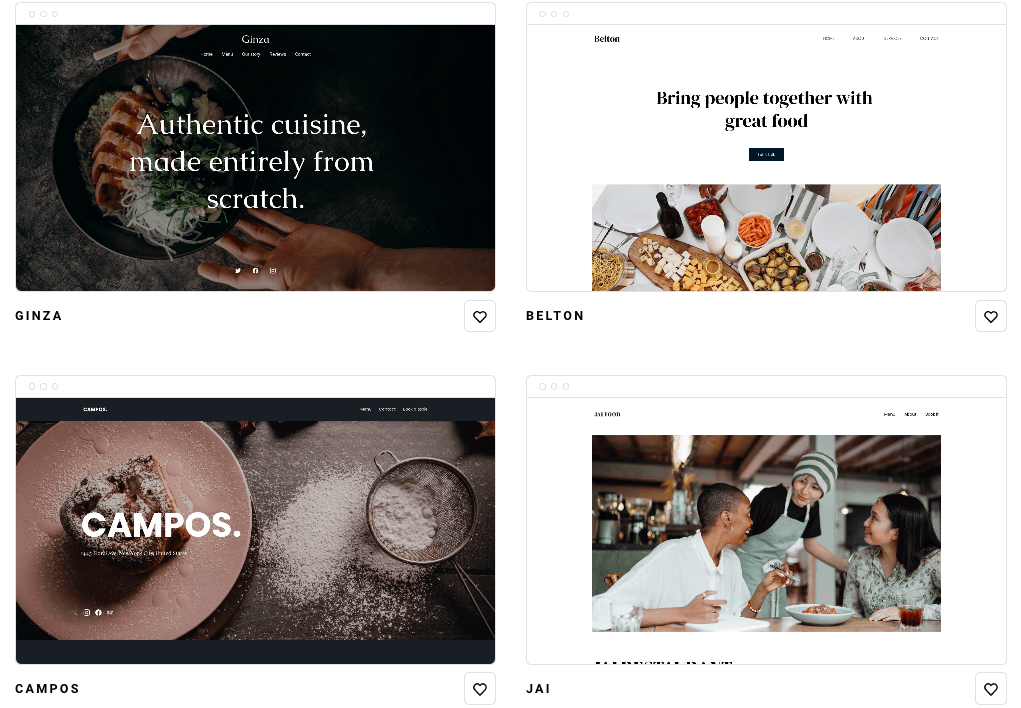
These designer-made templates straddle minimalism and elegance.
You can select one of these templates or opt for an AI-generated design. Another option is to start from scratch if you want to personalize every aspect of your website.
Hostinger’s editor is a grid-based drag-and-drop, offering simplicity and efficiency. This beginner-friendly editor makes it easy to get online faster, which is the builder’s primary selling point.
Important Features for Restaurants
Hostinger Website Builder is perfect for beginners. When you opt for a restaurant template, you’ll have access to its built-in restaurant features. For instance, feeding your content to the menu page only takes a few minutes.

Hostinger’s templates (the one pictured above is called Campos) also demonstrate Hostinger’s built-in reservation system, meaning you won’t be required to integrate a third-party reservation system. In terms of an online ordering system, you can use Hostinger’s online store capabilities to accept payments and set up an ordering system. It’s a good workaround since the site builder doesn’t have third-party online ordering integrations yet.
If you’re only establishing your branding, Hostinger Website Builders AI-powered tools will be your best friend. From a free logo maker to a content generator, it can help you strengthen your brand positioning and get online on the same day.

Hostinger’s AI tools can help restaurants enrich their online brand image.
Hostinger’s websites let you display a map that pinpoints your restaurant’s location, so visitors will know how to find you. Other ways to reach your audience are by using the platform’s SEO tools. Along with its mobile-friendly and SEO-optimized templates, using Google Analytics and Google Tag Manager can help you optimize your website for traffic.
Pros
- Decent selection of restaurant-ready templates
- Built-in menu and online reservation system
- AI tools that can help with branding and marketing
- Affordable plans
Cons
- Limited integration options–for instance, you can only use Hostinger’s online store to enable online ordering
- Basic blog feature, which could hinder search engine optimization efforts
Pricing: Hostinger’s pricing starts at ($9.99/month). They seem to offer this discounted pricing on a daily basis, so don’t let the “Deal ends in…” warning send you into a panic - chances are it’ll still be there tomorrow!
The Website Plan also includes ecommerce and online booking features.
Read our Hostinger Website Builder review here.
> Get started with Hostinger today
6. BentoBox
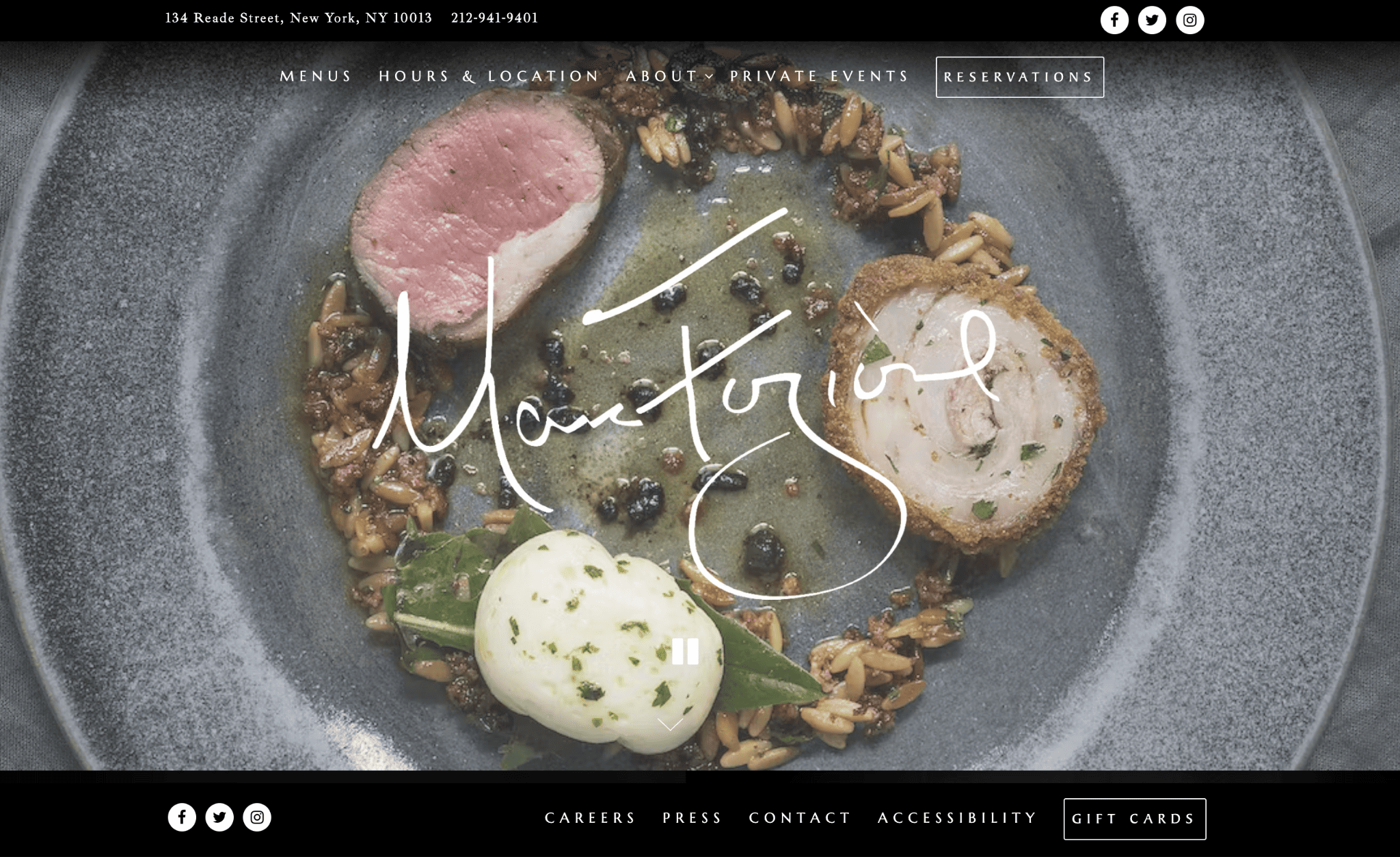
An example of a BentoBox Restaurant Website: Marc Forgione
BentoBox is the first specialized restaurant site builder on the list. It’s an all-around digital restaurant platform that provides POS, marketing, and online ordering services.
It’s an ideal solution if you want a completely hands-off approach to launching your website, as you’ll be leaving it to BentoBox’s team to whip up a custom-built design within 30 days. Each professionally-designed website is guaranteed to be mobile-responsive, SEO-optimized, and ADA-accessible.
You can, however, carry out updates yourself. The user dashboard is intuitive, making it easy to update your content. And if you need to expand your website’s capabilities, BentoBox has over 50 one-click integrations for shipping, POS, social and search, reservations, email marketing, delivery, payments, and printing:

Pros
- No DIY–the team behind it will handle all the design and technical details
- Professional design and complete set-up
- 50+ integrations to help you market and manage your business and serve your customers better
Cons
- Any website package you select will cost quite a bit each month - the cheapest is $149. You’ll effectively be paying for outsourcing the setup and management of your restaurant website
- Setup fees are charged upfront
- You’ll have to hand over control of the website and its design to their team
Pricing: To get a website, you can choose between Essentials Website ($149/month + $500 set up fee) or the Plus Website ($249/month + 1,000 set-up fee). These prices are only suitable for one location.
7. Flavor Plate

An example of a Flavor Plate website: Three Tomatoes
Flavor Plate is an affordable restaurant website builder. You can choose from their variety of stunning templates. Each of which has been ADA-tested and incorporates best practices for responsiveness and usability.

Flavor Plate offers 10 restaurant-specific templates.
Once you’ve chosen a layout, you have three options to bring your website to life: let the Flavor Plate website builder team complete it for you, collaborate with them, or DIY it. If you choose the first option, you must hand over your design assets to their team. If you decide to use the design editor to edit your own website, you must ask them to enable it under your account.
The design set-up is completely free. The monthly fee you pay goes to menu management, gift card sales, online ordering functionality, event scheduling, and communication tools.
Pros
- Affordable and comprehensible pricing plan
- Free web design help
- Beautiful templates
- Comprehensive revenue generation and content management features
Cons
- Flavor Plate owns the code you create
- Web design and management features are limited
Pricing: With Flavor Plate, you can sign up for an all-inclusive plan for $39 per month.
8. UpMenu

An example of UpMenu Website: La Piccola Pizzeria
With UpMenu, restaurant owners can develop simple websites by choosing from the platform’s ready-made themes:
 You can personalize your chosen template by editing its colors, adding your logo and content, and uploading pictures of your tasty menu items.
You can personalize your chosen template by editing its colors, adding your logo and content, and uploading pictures of your tasty menu items.
This restaurant website builder also facilitates the acceptance of online orders and reservations. Tools for SEO, marketing campaigns, and restaurant marketing automation are also available. You may have to pay an extra fee every month for some features.
Pros
- Free trial for 7 days
- Easy to use, you can add promotions and change menus at any time
- Comprehensive marketing solutions
Cons
- Third-party integrations are unavailable, you can only use the proprietary solutions
- The plans are expensive
Pricing: UpMenu has three pricing plans: Basic ($49/month), Standard ($89/month), and Premium ($169/month). For as low as the Basic plan, you can get a branded website and app. The only difference between the plans is the number of orders you can accept without an additional fee. For Basic, you have 90. Standard, 250. And Premium, unlimited.
9. Oracle’s GloriaFood

An example of a GloriaFood restaurant website: Sandwich Pizza House
Oracle’s GloriaFood has been mentioned several times because its online ordering function integrates with general site builders such as Weebly and Wix. It’s generally free to add the online ordering, booking and delivery widgets to your website.
However, it also doubles as a restaurant website builder. The resulting restaurant websites are optimized for search engines and are mobile-friendly. However, there’s a lot to be desired from a design standpoint since the layouts are mediocre at best, and customization is limited.
Pros
- Can be used for free
- Reliable online ordering and delivery system.
Cons
- Additional services like accepting payments and website builder come at an additional cost
- The design is inadequate
- GloriaFood doesn’t have integrations–but it can be integrated with most general site builders
Pricing: GloriaFood is free, but you’ll need to pay a small fee of $9/month to create a website. A domain is included in the price. If you wish to accept online payments directly to your bank account, you will need to pay an additional $29/month to link your payment gateway with your ordering system.
How to choose the best website builder for restaurants
Find the perfect restaurant website builder by determining your business goals. Here are a few tips to help you whittle down your list of choices.
1. Identify the type of restaurant website you need
Each website builder offers unique features. But you don’t have to tick all. Only keep an eye on key features that align with your goals.
To decide what kind of restaurant website you’ll need, ask yourself the following questions:
Will it be purely informational?
57% of diners check out menus online, while 45% look up locations, directions, and operating hours. If your site’s prime purpose is to display this information, you can opt for a no-frills, easy-to-use website builder.
General and specialized site builders can help you create basic informational websites. But make sure you don’t overlook the overall design as you stuff your site with menus and announcements. Choose a restaurant-friendly website builder with built-in templates, menu creators, and map integrations (discussed below) to expedite the web-building process.
Will it take online table bookings?
51% of guests find online reservations to be the most valuable restaurant technology. So it’s not surprising that most restaurants today provide online table bookings. A well-optimized reservation web page can help turn tables during slow periods.
For this type of website, there’s more to it than fill-in forms and booking calendars on your page. Take this example from a Wix-powered restaurant website, Yantra. The reservation page also includes terms and conditions to reduce no-show guests.
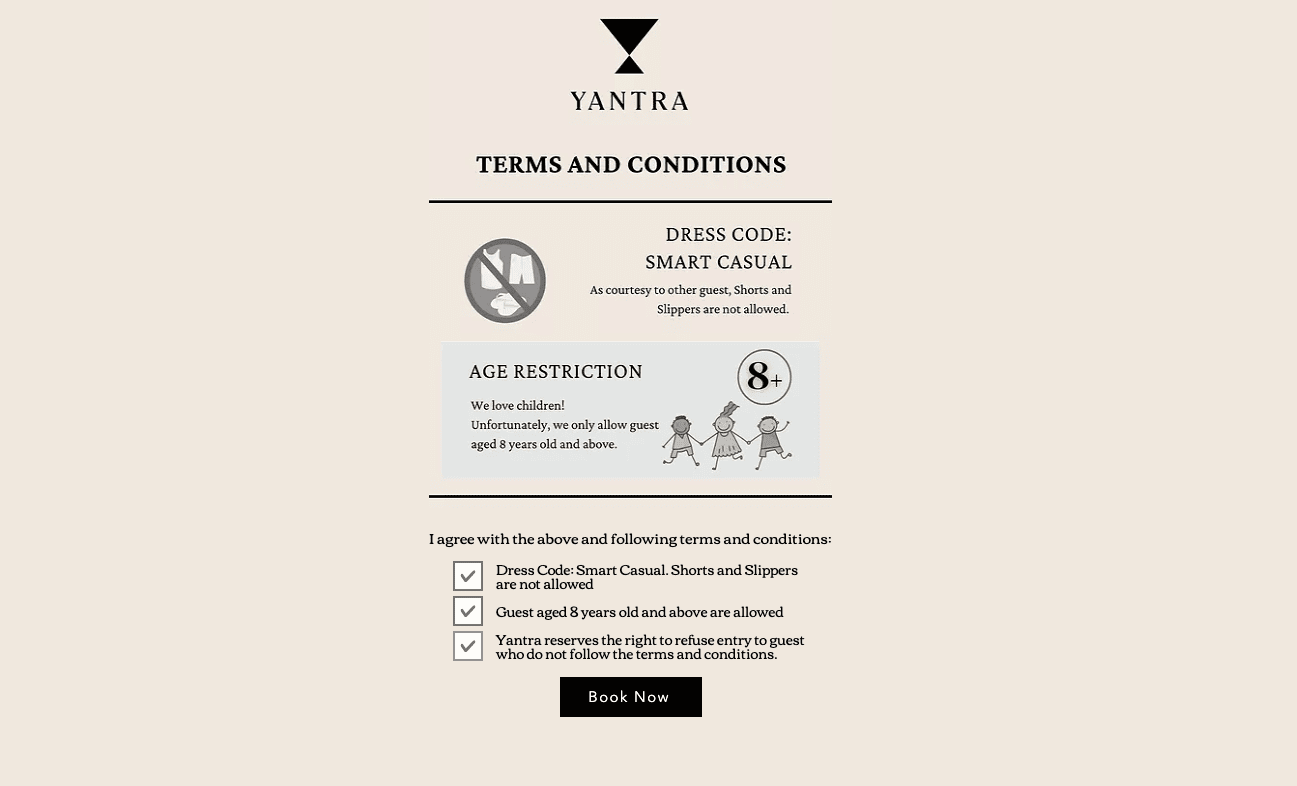
Some web builders have features other than the basic reservation calendar, such as tick boxes and booking reminders.Source: Yantra
Will it take online food orders?
51% of patrons use restaurant websites for food deliveries instead of third-party services like Grubhub and Doordash. With the right restaurant website builder, online ordering can be your key selling point.
60% of customers said that the most critical factor for online orders is the ease of ordering. Most general site builders can achieve it with the help of integrations. But restaurant-tailored web builders like GloriaFood, BentoBox, Flavor Plate, and UpMenu, have built-in online ordering features.
Define your website’s purpose before choosing a website builder. It’s inefficient and costly to switch providers later when you realize the one you’re using can’t deliver everything you need.
2. Make a list of all the features you need for your restaurant
A good website builder should include most, if not all, of the following features. This is only a brief overview of the fundamentals. Your website goals may require more.
Restaurant-specific templates
Generic, off-the-shelf templates can make your website look like a web copycat on the internet. It doesn’t matter if you have stunning food photography or clever, on-point copy. Customers may still presume that your site is cheap, unprofessional, and downright dull.
Aside from aesthetic considerations, restaurant-specific templates have advanced features, such as online booking or menu page layouts.
Fortunately, pre-made templates are the backbone of a website builder. Most restaurant website builders, such as UpMenu, have a good selection of restaurant templates. For generic website builders, Squarespace has the best templates and Wix has the most options. Note: All the site builders outline above feature beautiful designs for restaurants.
Menus
A restaurant website without a menu is like a ship without a sail. It’s simply not going to get very far. Menus are often the first thing customers look at, and they can be a dealbreaker if they don’t look appetizing enough.
Your website builder should enable you to create accurate, up-to-date menus that fit your brand identity. And as much as possible, don’t let customers scroll through a sea of text or download a PDF.
Squarespace, Flavor Plate, and BentoBox are some of the best platforms with efficient menu management. Look at how The Original, a Bento Box-designed restaurant website displays its menu on their website.

Look for a website builder that provides menu templates to help create a well-rounded webpage. Source: The Original
Maps
Nearly half of restaurant-goers check locations and directions online. It’s now a norm to Google “restaurants near me” whenever people dine out. With map integration, customers can locate your place faster. It also boosts local SEO.
Google Map elements can be integrated with different site builders. You can either insert a map into your webpage as a draggable element or as a section. Or use Google Maps to create a new map that you can embed on your website.
Here’s how Fat Choy, a Chinese-vegan restaurant, embedded a map block on its Squarespace website. Clicking the map redirects customers to their map apps, where they can get turn-by-turn directions to the diner.

Depending on your builder, you can drag and drop or embed a code snippet to put a map on your website. Source: Fat Choy
Third-party review site integration
95% of consumers read online local business reviews. Restaurants can take advantage of this by integrating third-party reviews, such as Google Reviews for Business, Yelp, and Trust Pilot, into their websites.
Third-party reviews are more trustworthy than typical testimonials. Some might cherry-pick the best testimonials to showcase on their homepage, but third-party reviews provide a more objective perspective.
Some general website builders make it simple to incorporate third-party reviews with a few clicks. For instance, in the GoDaddy website editor, you can add a “Reviews” section to your preferred location. Just “Add a Section” and look for “Reviews” under “Social”.

You don’t have to manually type and set up the third-party reviews with integration.
For restaurant-specific website builders, integrations are generally limited, meaning that you might have difficulty integrating your site.
POS system integration
According to 84% of restaurant professionals, a POS system is a pivotal technology for the food service industry. This integration gives you an overview of sales, inventory, and other data analytics, reducing errors and discrepancies.
It’s crucial that your chosen POS and website builder are compatible with one another, or that they were developed by the same developer. Some website builders compatible with POS systems are Wix, Squarespace, UpMenu, and BentoBox.
Gift card sales
Research shows that the gift card market is projected to grow by 9.5% in 2022. Therefore, a website builder with gift card processing capabilities can improve foot traffic and online orders for your restaurant business.
Some web builders like Squarespace can support this feature on their own. Simply add a Gift Card as a product in the Squarespace store page editor. After publishing, the builder automatically sets up the gift card on your site without using third-party apps.

Adding, canceling, or refunding a gift card is easier with a good website builder.
Source: Squarespace
Others like Weebly and GoDaddy can sell—but not create—gift cards. To create one, you’ll have to use gift card-selling platforms, such as Gift Up.
Social media integration
With over 4.26 billion users, social media has become a conduit for opportunities you want to attract. It lets you connect with people and expand your market base. This strategy can benefit any industry, so website builders with this integration are abundant. Social media integrations come in the form of elements, widgets, and advanced analytics—so you’re only limited by your creativity
Look how this website, Eat The Bird, nailed this subtle social media plug on its homepage. The website also displays tiny Instagram icons in the header and footer.

Web builders can help you turn your following into a community with social media integration. Source: Eat The Bird
Email marketing integration
Restaurant email marketing campaigns have an average open rate of 19.77% according to a Mailchimp study. That’s about 20 opened emails for every 100 sent. Fortunately, integrating email marketing into your website can help assess your performance to improve future campaigns.
Email integration allows you to use your website’s domain for your email. This can help improve deliverability because ISPs (Internet Service Providers) can’t easily flag your messages as spam.
With the right website builder, you can track email engagement, segment your mailing list, and create more engaging and branded content. For instance, GoDaddy’s Digital Marketing Suite includes email marketing software and up to 25,000 emails per month at no extra cost.
3. Consider what else you need in a website builder
The internet abounds with competitive website builders, making it tough to choose the right one. So here are some factors to consider as you narrow down your options.
Ease of use
A website builder is meant to build professional-looking websites without writing a single line of code. It should be intuitive enough for non-tech-savvy users to explore and use its key features. Learning its ins and outs should be effortless (and fun), especially if you’re running your diner 24/7.
Hostinger Website Builder is your easiest bet because of its designer-made templates, drag-and-drop functionality, and handy integration. For restaurant site builders, Flavor Plate’s team provides extra assistance when building your own restaurant website. The editor itself is also easy to navigate.
Customization options
All website builders can help you customize your website to some extent and tailor it to your brand’s layout, design, and workflow. This will help you set your website apart from thousands of others.
Design-wise, Wix offers more nuance than standard custom options, and professional solutions that other builders lack. Its drag-and-drop editor allows you to have complete control over the look and feel of your restaurant site. And on top of that, its app market boasts 49 apps for adding various design elements.

Wix helps you achieve the restaurant website you’ve always wanted.
Customer support
If you encounter any issues while designing your website, or after it goes live, you’ll want to be able to get immediate help. Make sure the builder you choose has prompt and top-quality customer support. Multiple support channels are also a major plus.

The best restaurant website builders should be backed by a solid support staff, such as GoDaddy’s award-winning team.
GoDaddy, for instance, offers dedicated customer support, including via phone call during service hours and live chat support 24/7.
Even the most user-friendly platforms can incur glitches and issues. Having accessible support teams to turn to for help is a non-negotiable criterion.
Mobile performance
Customers on the road looking for a place to dine use smartphones, not desktops. Your website builder should have a mobile-friendly interface to cater to mobile and tablet users. It should also include mobile-specific features, such as click-to-call and GPS directions.
Some site builders like Wix require you to re-edit the smartphone interface after creating the desktop version. Otherwise, the elements don’t fall into their proper places, causing slow loading speeds and higher bounce rates.
Fortunately, others like Hostinger and Weebly, offer fully responsive templates. This feature fits your website to the screen size and orientation of your visitors’ devices.
Search Engine Optimization (SEO)
People who visit restaurant websites are likely not directed there by ads, but rather by searching for them on their own. Look for an SEO-first web builder to rank higher in relevant searches, resulting in more customers finding your restaurant.
Squarespace has built-in SEO tools, such as sitemaps, content markup, SSL security, indexed URLs, and mobile optimization. The builder handles all the technical work, but you can still access everything through the SEO panel. Wix (SEO Wiz) and GoDaddy (SEO Wizard) will give you a step-by-step guide for boosting your search engine rankings.
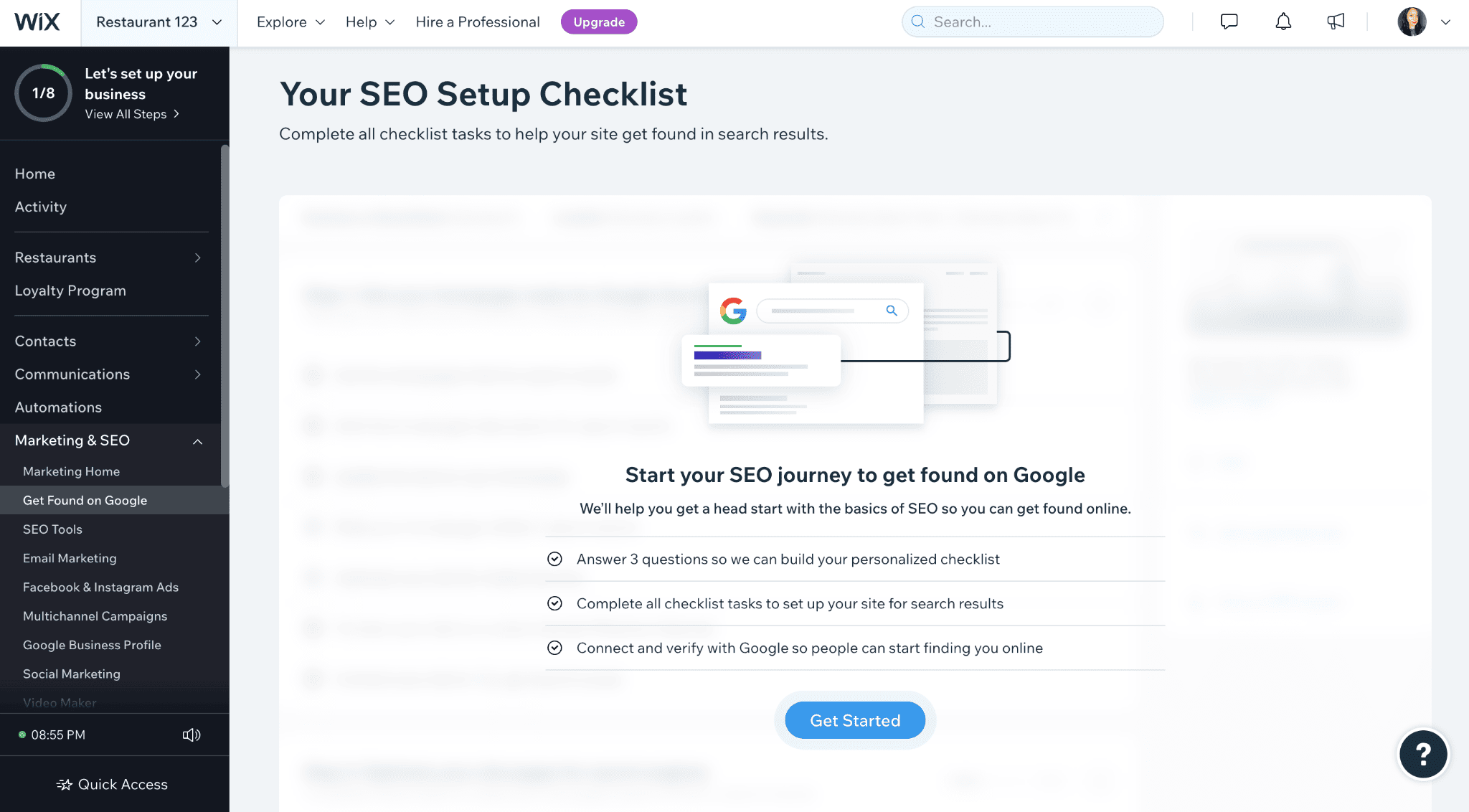
Wix offers users an SEO checklist that will help them rank higher on search engines.
4. Consider your budget
Premium site builders are more scalable and professional than their free-version or lower-priced counterparts. Before you subscribe to one, consider your budget and willingness to spend.
Do you prefer monthly or annual payments? Are you willing to pay additional fees for website plugins? Website builder costs vary depending on the key features and level of customization. And generally speaking, restaurant website builders tend to be costlier than general website builders.
A high price tag doesn’t make the best restaurant website builders. Choose a platform that fits your budget and goals, so you won’t have to spend more than you can afford.
Restaurant Website Builders FAQ
Is WordPress good for restaurants?
Built-in WordPress themes are limited, so you may need to pay for third-party WordPress themes and plugins to get the website you want. The site builder also requires more of a learning curve than a standard website builder.
However, its complex features allow for greater customization and optimization. It’s an excellent option for your restaurant business, provided you have the necessary knowledge and budget to take advantage of it. Learn more about how to build a website with WordPress.
What pages should a restaurant website have?
Your restaurant website should contain key pages that provide information to patrons and prospects alike. Here are some to consider:
- Home
- Menu
- Reservations
- Online delivery
- Shop / Gift cards
- Contact information
- Membership / Loyalty programs
- Gallery / Special events
- Testimonials
- Blog / Press
- About
You can leave some things out. Only go for those that work for your restaurant business and brand. Make sure you update their content regularly.
Final Thoughts: Best Website Builder for Restaurants
A good restaurant website enables people to find what they’re looking for in a jiffy. Your website should be a welcoming host for patrons and first-time guests 24/7. Ideally, it should have everything they need to know about your business, such as your email address, phone number, location, and social media handles. It should also include information on menu items and how to book or order, even if those functions aren’t provided online.
The perfect recipe includes enticing web design, informative (but not bland) content, and seamless navigation. When in doubt, a clean and elegant restaurant website is the best way to go - and any of the restaurant builders detailed above can help you build that.
Of course, it makes sense to only add features and elements relevant to your brand, and that should be the main determining factor when deciding on which restaurant website builder to pick. Whether you have a tight budget and only need an informational website, or have a little more to invest in features like online ordering and bookings, we hope that our article has helped to make the decision a little easier for you.
If not, please let us know your questions in the comments below - we’d be happy to help!
We keep our content up to date
30 Aug 2023 - General update
THE BEHIND THE SCENES OF THIS BLOG
This article has been written and researched following a precise methodology.
Our methodology


